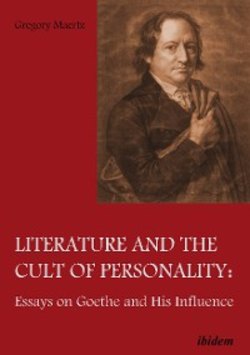Literature and the Cult of Personality

Описание книги
The construction of Johann Wolfgang von Goethe as an Anglo-American sage and literary icon was the product of a cult of personality that lay at the center of nineteenth-century cultural politics. A reconstruction of the culture wars fought over Goethe’s authority, a previously hidden chapter in the intellectual history of the period ranging from the late eighteenth century to the threshold of Modernism, is the focus of Literature and the Cult of Personality. Marginal as well as canonical writers and critics figured prominently in this process, and Literature and the Cult of Personality offers insight into the mediation activities of Mary Wollstonecraft, Henry Crabb Robinson, the canonical Romantic poets, Thomas Carlyle, Margaret Fuller, George Eliot, Matthew Arnold, and others. For women writers and Jacobins, Scots, and Americans, translating Goethe served as an empowering cultural platform that challenges the myth of the self-sufficiency of British literature. Reviewing and translating German authors provided a means of gaining literary enfranchisement and offered a paradigm of literary development according to which 're-writers' become original writers through an apprenticeship of translation and reviewing.
In the diverse and fascinating body of critical writing examined in this book, textual exegesis plays an unexpectedly minor role; in its place, a full-blown cult of personality emerges along with a blueprint for the ideology of hero-worship that is more fully mapped out in the cultural and political life of twentieth-century Europe.
Отрывок из книги
ibidem Press, Stuttgart
Preface
.....
Carlyle’s alienation from the dominant cultural institutions of Britain was experienced by other contemporaries, whose own literary careers were launched in unconventional paths of mediating mostly foreign cultural artifacts. Indeed, the reception of German thought and literature in Britain from the seventeenth through the nineteenth centuries was largely the work of culturally ambitious outsiders—Dissenters, women, and Scots—for whom access to the majority culture was impeded by gender, class, or ethnic identity and by the absence of empowering institutional affiliations with prestigious public schools or with Oxford or Cambridge University. In addition to Carlyle, this group includes William Taylor, Mary Wollstonecraft, Thomas Holcroft, Walter Scott, R. P. Gillies, J. G. Lockhart, Henry Crabb Robinson, Sarah Austin, and Marian Evans (George Eliot). All of these writers preceded the publication of their original work with the translation and criticism of German texts. Such labors reflected their lower-caste status within the majority culture, since it was left to them to mediate the perceived transgressive moral and political elements in German literature before these texts were suitable as commodities for domestic cultural consumption. These mediating activities embodied the shaman’s traditional function of going-out-of-the-self and leaving-the-familiar in an effort to embrace the foreign and the other. Serving as a meditative link or bridge, however, risked political defilement of the intermediary and brought suspicion upon him or her by critics associated with defending the nationalist status quo.
Carlyle endorsed and then appropriated Staël’s vision of German literature (which emphasized Sturm-und-Drang heroic individualism and sublimity) because it offered a vehicle of self-cultivation and spiritual fulfillment that surpassed what could be accomplished by the neoclassical aesthetic consensus. Heine, by contrast, finds these very same qualities—especially hero worship—dangerous because they contradict the egalitarian values enshrined by the French Revolution. In his view there was a direct correspondence and a reciprocal relationship between “the lack of political freedom in Germany” and the cultural dominance enjoyed by Goethe’s aesthetic “indifference.” Peter Uwe Hohendahl’s description of Heine’s treatise could also be applied to De l’Allemagne and Carlyle’s essays on Goethe. He argues that Die Romantische Schule “combines in a highly unorthodox manner personal characteristics, descriptions of works, satire, historical commentary, and critique of ideology.” What Heine calls “this constant assertion of my personality” in his satire, which also breaks through in Staël’s highly idiosyncratic interpretations and in Carlyle’s worshipful essays (and is denoted by his baroque style), is considered “the most suitable means of encouraging self-evaluation from the reader.”[33]
.....
